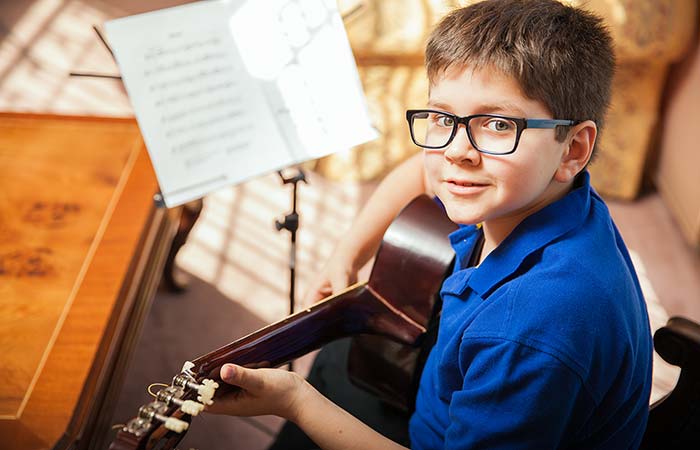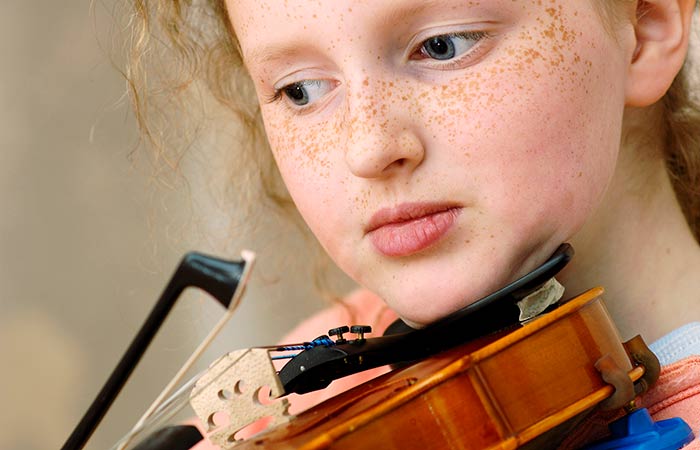The question of whether musical talent is a result of nature (genetic inheritance) or nurture (environmental influences) has intrigued psychologists, educators, and musicians for decades.
Both elements play significant roles, and understanding their interaction can help in developing musical abilities, whether a child shows natural aptitude or not.
So, the big question remains: is musical talent nature or nurture?

The role of genetics in musical talent
Research suggests that genetics can predispose individuals to certain traits advantageous for music.
For example, one’s genetic makeup could influence one’s ability to hear pitch well, perceive rhythms accurately, or even the manual dexterity needed to play instruments.
Studies involving twins have shown that identical twins (with the same genetic material) are likelier to exhibit similar musical skills than fraternal twins.
Moreover, certain genetic conditions, such as Williams Syndrome, demonstrate a heightened musical affinity, further underscoring the potential genetic basis for musicality.
However, possessing genetic predispositions for music does not guarantee proficiency; it merely provides a potential foundation.

The impact of environment on musical ability
Nurture plays a crucial role in musical development. Exposure to music from an early age can dramatically influence a child’s ability to develop musical skills.
Regular interaction with music, whether through listening, singing, or playing instruments, helps in honing auditory skills and musical understanding.
Educational opportunities also play a vital role. Access to music education, whether formal lessons or informal learning environments, can enhance a child’s ability to understand and create music.
Support from family, teachers, and peers encourages continued practice and improvement, which is critical for mastering any musical instrument or skill.

Developing musical talent in children
Regardless of a child’s natural inclination towards music, development in this area can be encouraged.
Here are several strategies:
Number 1: Early exposure
To foster an appreciation and understanding of music in children, it is beneficial to introduce them to a diverse range of musical styles and genres from an early age. This can be easily accomplished in several enjoyable ways.
For example, regularly playing different types of music at home can pique children’s interest.
Additionally, taking children to live concerts can give them a dynamic and immersive musical experience.
Engaging children with musical toys, such as keyboards, drums, or even simple shakers, also helps develop their auditory skills and can spark a lifelong interest in music.
This varied exposure can enhance their cultural awareness and potentially uncover hidden talents or interests in specific musical areas.
Number 2: Encouragement and support
Positive reinforcement from parents, teachers, and mentors is crucial in motivating children to engage with and persist in musical activities. Celebrating every achievement, no matter how small helps build their confidence and reinforces their interest in music.
For instance, applauding their first song, encouraging each practice session, or recognising their participation in a music class can make a significant difference. Regular encouragement helps children understand that the effort they put into their musical endeavours is valued, which can inspire them to set higher goals and continue improving.
Providing support can also involve attending their performances, offering constructive feedback, and even participating with them in musical activities at home. This consistent support system nurtures their musical skills and boosts their overall self-esteem and determination to succeed in other areas of life.
Number 3: Formal training
Enrolling children in music lessons can significantly boost their musical abilities. A skilled teacher not only improves their technical skills but also helps in nurturing a love for music.
Through structured lessons, children learn to read music, understand theory, and master their instrument of choice, whether piano, violin, drums, or voice. Regular practice instils patience, focus, and perseverance. Teachers expose students to various musical styles, fostering diversity and helping them discover their own talents.
Additionally, teachers serve as mentors, providing encouragement and feedback that boosts confidence and motivates students to excel in music and beyond. Formal training thus lays a strong foundation for musical growth and personal development.
Number 4: Practise
Regular practice is essential for developing musical skills. Encouraging a consistent routine builds discipline and skill over time. Establishing dedicated practice times teaches commitment and perseverance, fostering gradual improvement.
Additionally, consistent practice sessions allow children to reinforce lessons, explore new techniques, and overcome challenges. Children become more engaged in their musical journey by taking ownership of their progress and setting goals.
Incorporating diverse and enjoyable practice activities, such as exploring different genres or improvising melodies, keeps children motivated and encourages creativity. With structured yet enjoyable practice, children stay committed to their musical pursuits and continue to grow and develop their skills.
Number 5: Providing resources
Ensuring children can access musical instruments and other essential resources is fundamental to nurturing their musical development. Equipping them with the necessary tools empowers them to engage more deeply with music and unlock their potential.
Having suitable instruments at their disposal enables children to practise efficiently and explore different sounds and techniques. Moreover, access to sheet music, instructional materials, and recording equipment expands their learning opportunities and fosters creativity.
Thus, investing in quality instruments and supplementary materials enriches the musical journey for children, allowing them to fully immerse themselves in the world of music and realise their aspirations.
Number 6: Foster musical exploration
Encourage children to explore different instruments and music genres to broaden their musical horizons and spark passion. Allowing them to experiment with various tools and styles helps them discover preferences and strengths, fostering creativity and innovation. Exposure to diverse genres introduces them to varied sounds, inspiring them to explore their musical identity.
This exploration cultivates a love for music, nurturing skills like creativity and self-expression. Providing opportunities for such exploration empowers children to embark on a lifelong journey of musical discovery and growth.
Number 7: Social opportunities
Engaging in group musical activities like bands, orchestras, or choirs offers children invaluable social benefits. Beyond the joy of creating music together, these experiences nurture a sense of belonging and camaraderie.
Collaborating with peers during rehearsals and performances enhances not only musical skills but also teamwork, communication, and cooperation. Shared achievements in group settings bolster self-confidence and motivation, highlighting the collective impact of their efforts.
Furthermore, participation in musical ensembles fosters leadership development and responsibility. Children learn to contribute their unique talents to the group dynamic, gaining valuable skills for life.
Overall, these activities provide a rich social environment, enriching children’s lives and fostering lifelong friendships, showing that music is not just a passion but also a pathway to meaningful social connections.

Conclusion
While genetic factors may provide a foundation for musical talent, the environment substantially shapes and cultivates this potential.
Parents and educators can develop musical talents in children regardless of their innate abilities by nurturing their love for music through supportive, resource-rich, and practice-oriented environments.
In the intricate dance between nature and nurture, harmony between the two ultimately creates music.









